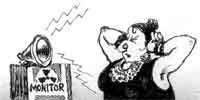Thailand
 Gemologists in Bangkok say that hundreds of dangerously radioactive gemstones are circulating in Asian markets and some of them have found their way into finished jewellery. Tests conducted by radiologists in the city revealed that some stones had radiation levels 50 times higher than that permissible under us standards. These can lead to health problems including cancer.
Gemologists in Bangkok say that hundreds of dangerously radioactive gemstones are circulating in Asian markets and some of them have found their way into finished jewellery. Tests conducted by radiologists in the city revealed that some stones had radiation levels 50 times higher than that permissible under us standards. These can lead to health problems including cancer.
The main reason for concern is batches of a precious stone called "cat's eye' that are believed to have been irradiated to change their colour from yellow to an unusual chocolate hue. Yellow-coloured stones cost a few hundred us dollars per carat, whereas the chocolate-coloured ones are priced at thousands of dollars per carat. "It is most likely that the stone has been bombarded with neutrons in a nuclear reactor,' warned the Center for Gemstone Testing, Bangkok.
Recently, a 30-carat radioactive cat's eye set embedded with diamonds in a finished ring was found at a jewellery fair in Hong Kong. "When it was placed in front of a Geiger counter (which is used to measure radioactivity), we literally leapt back,' said Jon McDonald, editor at a local jewellery media firm, who witnessed the testing of the ring. "The machine was just screeching every time the ring went near it,' he pointed out.
Tests conducted recently on a 3.5-carat stone showed radioactivity levels higher than 52 nanocuries per gram. Gemologists point out that the acceptable level according to us standards in one nanocurie per gram while that in Asia is two nanocuries per gram. "This is dangerous. It could make your skin cancerous and destroy white blood cells,' said Bandhong Wangcharoenroong, director of radiation measurement division at Thailand's Office of Atomic Energy for Peace.
Hundreds of carats of the stones are thought to be circulating in Bangkok. But the problem is region-wide, said Ken Scarratt, director of the Center for Gemstone Testing. "The biggest problem is in places like Indonesia and Japan,' said Scarratt. "In Indonesia, a gem laboratory has seen hundreds of these stones coming through.' But an Indonesian jewellery industry official doubted his country was the source of the radioactive stones. "Indonesia buys a lot of gemstones from Burma, Thailand and India. But to my knowledge, there are no laboratories here to treat these stones,' he said.
Thai gemstones dealers have been buying radiation detectors as pointed out by distributors. "Most of the people doing business in Thailand have very little knowledge of radiation in gemstones. I hope we can help educate them' said Monta Chaiyabal, managing director of Duwell Intertrade Co, which sells Geiger counters.
Related Content
- Integrating co-benefits into Nationally Determined Contributions, climate policies and air pollution policies in Asia
- Fossil fuel subsidies and GHG emissions: firm-level empirical evidence from developing Asia
- International labour migration in a changing climate: insights from Malaysia and Thailand
- Thailand’s clean electricity transition: how accelerated deployment of renewables can help achieve Thailand’s climate targets
- Modeling traffic congestion effects on air pollutants
- Gender, health and air pollution
